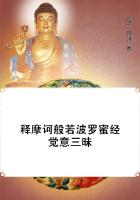First, some conception or notion of the object perceived;secondly, a strong and irresistible conviction and belief of its present existence; thirdly, that this conviction and belief are immediate, and not the effect of reasoning." ("Works," P.258.) The two first of these he discovers by an analysis of the concrete act.They are not happily expressed.The better statement is, that in perception we know at once the object; and this knowledge embraces what he calls the " notion " or " conception," -- phrases which should be reserved for the abstract and general notions which are formed by a subsequent discursive process, -- and also what he calls the conviction and belief, which latter phrase should be confined, I think, to the conviction which we have of objects not now present, to objects of faith as distinguished from objects of sight or sense generally.By giving this account we are saved from being obliged to represent such ideas as extension as concomitants of our perceptions.The correct statement is that, by sight and touch, -- I believe by all the senses, we know objects as extended -- , and we can then separate, by abstraction, the extension from the other parts of our concrete cognition, and can also inquire what intuitive convictions are involved in it.Hamilton, venturing " a step beyond Reid and Stewart, no less than Kant " has fallen into the awkwardness of calling in both an <a priori> conception with Kant, and an <a posteriori> perception with Reid.(P.126.) Our cognition of extension is just one experience, but involves certain intuitive convictions.{214}
Reid, like Locke, draws the distinction between the primary and secondary qualities of matter; but he grounds it on a different principle.According to Locke, primary qualities are " such as are utterly inseparable from the body in what state soever it be." (" Essay" II., 8.)According to Reid, , the distinction is this, that our senses give us a direct and a distinct notion of the primary qualities, and inform us what they are in themselves.But of the secondary our senses give us only a relative and obscure notion.They inform us only that they are qualities that affect us in a certain manner; that is, produce in us a certain sensation: but, as to what they are in themselves, our senses leave us in the dark." He says more expressly: "Of some things, we know what they are in themselves: our conceptions of such things I call <direct>.Of other things, we know not what they are in themselves, but only that they have certain properties or attributes, or certain relations to other things: of these our conception is only <relative>." (P.513.) Hamilton remarks that "by the expression, 'what they are in themselves,' in reference to the primary qualities, and of `relative notion' in reference to the secondary, Reid cannot mean that the former are known to us <absolutely and in themselves>; that is, <out of relation> to our cognitive faculties." (PP.313, 314.)Certainly Reid was not dealing with such ideas as the absolute, and things " out of relation to our faculties: "these are phrases and distinctions belonging to a very different philosophy.He means that, when we look on a material object, we are led to believe it to be extended;whereas, when we experience the sensation of heat, we simply know that there must be an external object causing it, without knowing what it is.When physical science shall have thrown farther light on the qualities of bodies, I should like to have the distinction between the primary and secondary qualities of bodies reviewed by a competent philosopher.For the present, the distinction, as drawn by Reid, seems to me to be upon the whole the best: " The notion we have of primary qualities is direct, and not relative only." Hamilton might have done well, in reference to his own theory of relativity, to ponder the statement of Reid: " A relative notion of a thing is, strictly speaking, no notion of the thing at all, but only of some relation which it bears to something else." {215}
The substance of the "Essays on the Intellectual Powers of Man," was delivered annually, for more than twenty years, in lectures to his class in the University of Glasgow, and for several years before in Aberdeen.He commences with such topics as the explication of words, principles taken for granted, analogy, the proper means of knowing the operations of the mind, the difficulty of attending to the operations of the mind, on all of which he has remarks characterized by much sound sense and fitted to be eminently useful to those entering on the study of the human mind.He closes Essay 1.
with a classification of the mental powers: (1) The powers we have by means of our external senses; (2) Memory; (3)Conception; (4) The power of resolving and analyzing complex objects, and compounding those that are ******; (5) judging;(6) Reasoning; (7) Taste; (8) Moral perception; and, last of all, consciousness.may offer a few remarks on each of these.
<Perception>.After the full discussion in which we have been engaged in reviewing his " Inquiry," it is not needful to dwell on this subject.A large portion of Essay II.is occupied with a review of the " sentiments of philosophers about the perception of external objects," such as the Peripatetics, Malebranche, Descartes, Locke, Berkeley, Hume, Arnauld, and Leibnitz.His account of the opinions of these men is marked by great conscientiousness and candor: it is generally clear, often searching, always characterized by plain sense, at times superficial and mistaken.Hamilton has shown that Reid has fallen into gross blunders from not having mastered, as a whole, the higher speculative systems, such as those of Aristotle, Descartes, and Leibnitz.Hamilton's notes should always be read with Reid's exposition.These notes are as valuable for their logical acumen and erudition, as the text is for its independence and its homely sense.















